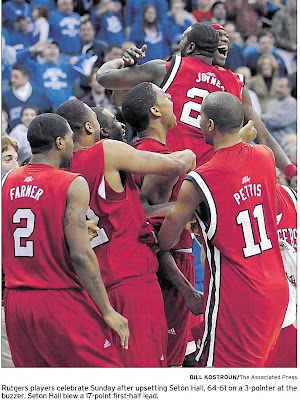Courier News - February 10, 2011
Back in early December of 1965 I witnessed what for years seemed like one of the most remarkable comebacks ever made by a Rutgers basketball team. It was an early season game against the University of Delaware at the Blue Hens home court. The home team led from the opening tap and with just 1:04 left was up by seven. Somehow Rutgers got it down to three, but there was only eight seconds left with Jim Valvano on the line for two foul shots. Obviously, Valvano had to make both shots, which he did. The strategy was to foul and hope the shooter missed at least one shot (this was long before the three point shot). Whether the strategy would have worked or not proved academic when Valvano tipped the inbound pass to Bob Lloyd in perfect position for an unopposed layup and Rutgers first lead of the night. The only thing wrong with the play was it took just two seconds, leaving the Blue Hens six seconds for a last possession which came up empty. In addition to being a dramatic come from behind win, it was an historic night since Lloyd's last basket were his 50th and 51st points, a Rutgers record later tied by Eric Riggins. The 1965-66 team went on to a 17-7 record, the most wins in school history to that point, falling just short of an NIT bid.
Philadelphia Inquirer - February 10, 2011
Considering the rules at the time, no shot clock, no three point shot, it's hard to believe a team could score four points in two seconds. Even harder to believe, however, is what happened in our final buzzer beating shot on February 9, 2011 when Rutgers took on Number 9 Villanova at the RAC. It was Mike Rice's first season as coach and while the team had played incredibly hard, they had suffered a number of tough losses. Coming into the game, the Knights were 12-11, but just 3-8 in the Big East and in a three game losing streak. Given the opposition, there didn't seem much chance the streak would end that night and the first half went according to form, with the Wildcats up 35-28 at the break. Once the teams were back on the floor, however, Rutgers mounted a comeback to close to within 48-44. Teams are in the top ten for a reason, however, and Villanova put on a spurt that gave the Wildcats a 64-51 lead with just 5:06 left. Rutgers managed to cut the deficit to nine, but there were just two minutes left.
Philadelphia Inquirer - February 10, 2011
As with the 1965 comeback, Rutgers was at the foul line, but Mike Coburn was only able to convert one of two. It worked out for the best, however. Dane Miller grabbed the rebound and threw it back to Jonathan Mitchell who hit a straight away three to cut the lead to five. Nor was Miller done, he stole the inbound pass, leading to James' Beatty's three pointer from the right corner. Suddenly, Rutgers was down by only two, 70-68 with 1:34 left. Rutgers had made up seven points without Villanova even getting the ball out of the backcourt. However, the Wildcats still had some answers. Showing plenty of poise for a freshman, James Bell was fouled after grabbing an offensive rebound and calmly sank both shots to put Villanova back up by four. Mitchell promptly matched Bell's effort with a basket to get it back to a two point deficit, but Bell hit a three with just 11.9 seconds left to put Villanova up 75-70.
Record - February 10, 2011
Rutgers had to score quickly and did so when Beatty banked in another three to make it 75-73, but there were just 6.3 seconds left. Rutgers quickly fouled Corey Fisher who only made one of the two shots, giving Rutgers a chance for a desperation three point attempt. Beatty got the ball into the forecourt and kicked it back to Mitchell who was on the far right wing, well outside the three point line. Mitchell claimed he "just let fly." From where I was watching, the ball looked like it was following a homing signal to the basket. Not only did it go cleanly through the net, Mitchell was fouled on the play. After Villanova took a timeout, the Rutgers senior made the free throw with just .8 seconds on the clock. The Wildcats had time for a full court pass, but the receiver caught it out of bounds. Rutgers had won on what Jerry Carino labeled, without overstatement, "one of the greatest shots in Rutgers Men's basketball history." Likewise Mitchell acknowledged it was "definitely" the biggest shot of his life." Perhaps somewhat lost in the excitement was the fact that Rutgers had scored seven points in seven seconds, prompting Dick Jerardi of the Philadelphia News to wonder "How is that possible?"





























